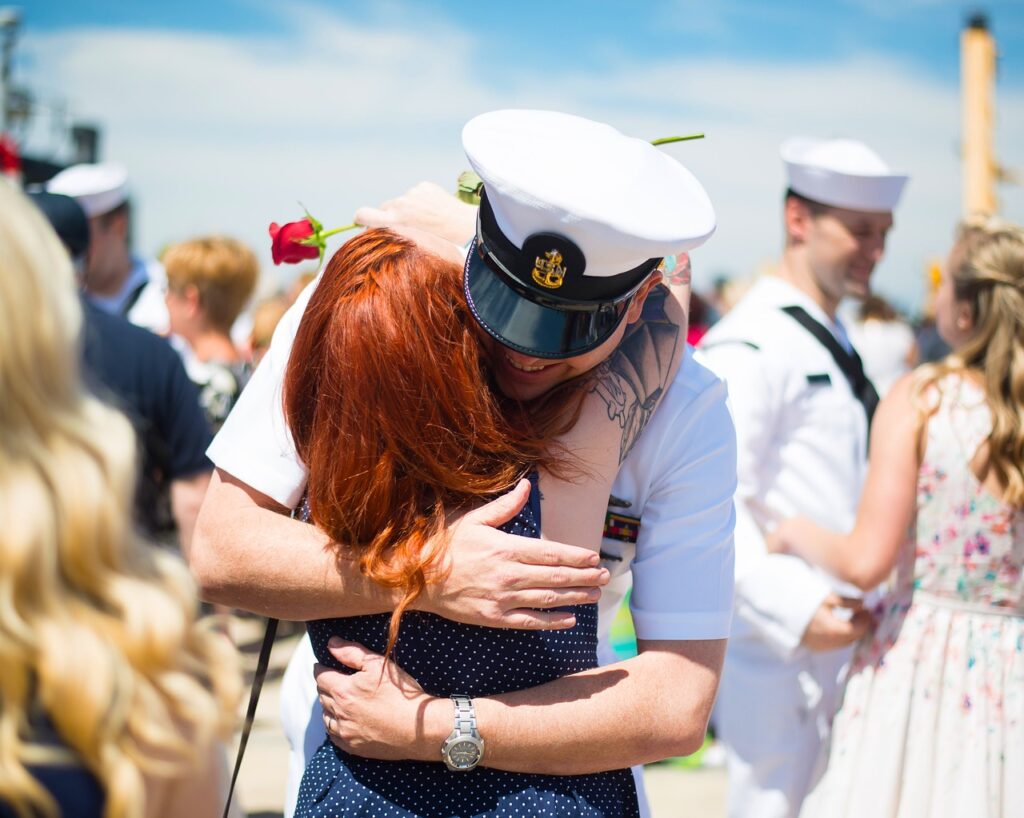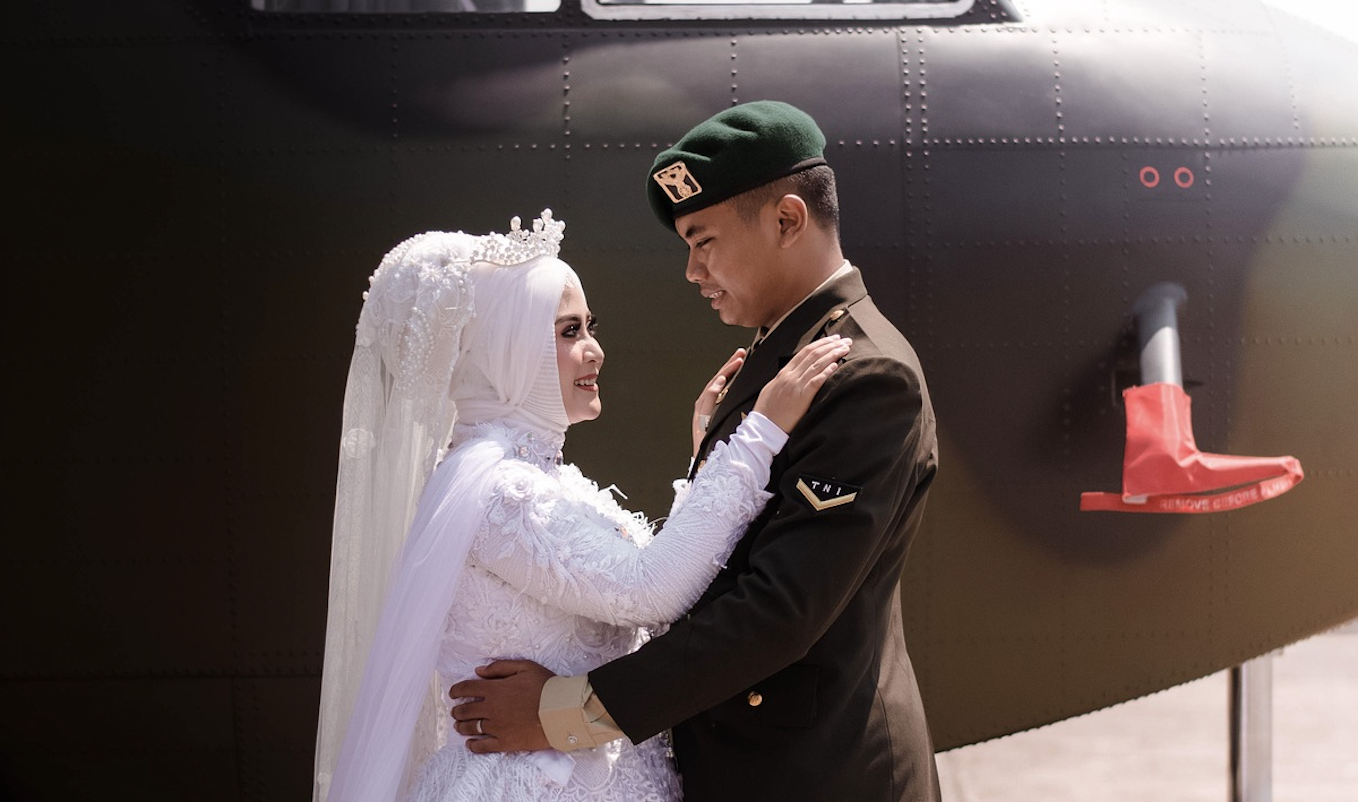Military weddings are unique compared to non-military weddings. They differ in some aspects, including the dress code, military traditions, guest list, and the chapel. However, most other aspects are quite similar. Military weddings hold a special significance for those associated with the military community. In this article, we will delve into the details of military weddings, including the dress code, sword ceremonies, guest lists, military chapels, planning intricacies, the profound symbolism that a military wedding can carry, and more!
Dress Code at a Military Wedding
At a military wedding, the bride and/or groom wear their military uniform, showcasing the rich tradition and discipline inherent in military service. For instance, a groom may opt for the classic Army Service Uniform, the Marine Corps Dress Blues, or the Navy’s Service Dress Blue Uniform (depending on which branch they’re in, of course). The uniforms are adorned with specific decorations, such as ribbons, medals, and insignias, each carrying its own significance. This attention to detail is not only a nod to military regulations but also a visual representation of the commitment and dedication of the bride and/or groom.
Ceremonial Sword Arch (i.e. Saber Arch)
The ceremonial sword arch, commonly known as the saber arch, is a distinctive and time-honored tradition observed in military weddings. This ceremony involves the formation of an arch with crossed swords or sabers, typically held by six to eight military friends dressed in uniform.
As the newlywed couple exits the ceremony venue, they pass beneath this arch created by the swords. This ceremony has evolved into a symbolic gesture within the military community, signifying the collective support and best wishes of fellow servicemen and women for the newlyweds. The saber arch adds a ceremonial grandeur to the occasion, making it a visually striking element of military weddings.
Involvement of Military Personnel in the Guest List
The involvement of military personnel in the guest list of a military wedding is a distinctive aspect that adds a sense of camaraderie and honor to the celebration. At any given military wedding, you’re likely to see lots of uniformed men and women sitting in the pews.
Military weddings often include inviting fellow servicemen and women, turning the event into a community affair. The guest list may include not only close family and friends but also colleagues from the military unit to which the bride or groom belongs.
The participation of military comrades goes beyond mere attendance; they often play active roles in ceremonial aspects, such as forming the ceremonial sword arch or participating in other military traditions. This involvement creates a unique atmosphere, fostering a strong sense of support and shared experiences within the military community.
Unique Challenges of Planning a Military Wedding
Planning a military wedding presents a set of unique challenges that distinguish it from traditional non-military ceremonies. One of the primary challenges is navigating the uncertainties associated with military life, such as deployments and duty rotations. The need for flexibility in planning becomes paramount as military obligations can influence the timing and logistics of the wedding. Additionally, coordinating the involvement of military personnel, including comrades and perhaps even superiors, requires careful consideration of military protocols and schedules.
The choice of location becomes a distinctive factor, as military weddings often take place on or near military bases and/or at military chapels, bringing logistical considerations into play. For instance, to secure a military chapel for a wedding ceremony, the bride and groom must contact the installation’s chaplain office. The process may involve meeting specific eligibility criteria, including the military affiliation of either the bride, groom, or both.
Moreover, the adherence to specific military traditions and dress codes adds an extra layer of complexity to the wedding planning process. For example, ensuring there are six to eight servicemen and/or women available to make the saber arch after the wedding ceremony can be stressful.
Balancing these challenges while ensuring a memorable and meaningful celebration demands meticulous attention to detail. We salute you in your effort to create a magical day for your military wedding!
Military Wedding Etiquette
Wondering what military wedding etiquette might be required? Guests attending a military wedding are expected to adhere to certain protocols, including a respectful observance of military traditions and customs. Understanding the dress code is crucial, as military weddings often involve uniformed attire for the bride, groom, and sometimes even guests. Military protocol during the ceremony, such as the timing of events and the handling of swords, requires timely attention.
Symbolism in Military Weddings
Symbolism plays a profound role in military weddings, elevating the ceremony beyond a traditional union of two individuals. The uniforms worn by the bride and groom hold immense symbolism, representing not only their commitment to each other but also their dedication to service and duty. The precision and formality of military attire reflect the disciplined nature of military life. The Ceremonial Sword Arch, where the couple walks beneath crossed swords, symbolizes the safe passage into their new life together, guarded by the honor and commitment of their fellow servicemen and women. Beyond these visible symbols, the entire ceremony is steeped in the values of unity, patriotism, and sacrifice. The exchange of vows against the backdrop of military traditions amplifies the significance of the commitment being made. Military weddings, laden with symbolic gestures, create a powerful narrative that honors love, duty, and the shared experiences of a unique community dedicated to serving their country and each other.
Tips for Planning a Memorable Military Wedding
Planning a wedding for a non-military wedding is daunting; now add in the extra layer of military requirements, and you’ve got your work cut out for you! Let’s walk through some of our best tisp for you to plan your memorable military wedding.
Rank insignia wedding cake
Adding in a wedding cake with the bride or groom’s rank insignia on the frosting is a cute way to incorporate a personal touch while also maintaining the military theme.
Cutting the cake with the swords
Many military couples that opted for the ceremonial sword arch after the wedding ceremony may also use those swords later for cutting the cake. Typically, one military friend or peer will hold the sword while the bride and groom gently hold onto it and cut the cake together.
Playing military anthems
Incorporating any hymns, tunes, or anthems of the bride or groom’s branch of the military can also be a nice personal touch. Perhaps while the newlyweds enter the reception area or immediately following the ceremony.
Maintain flexibility
Flexibility is crucial, considering potential challenges like deployments or last-minute duty assignments. One tip for maintaining flexibility is choosing a convenient location accommodating any last-minute surprises.
Communication
Communicating with military comrades about their roles in the ceremony ensures a cohesive and well-coordinated event. For example, ensuring those included in the saber arch ceremony are well-informed and reminded of their duties.

Final Thoughts
In conclusion, a military wedding is a profound celebration that goes beyond the union of two individuals. It encapsulates love, duty, and the shared experiences of a special and dedicated community. As we honor these unions, we also pay tribute to the commitment and sacrifices of those who serve.
Frequently Asked Questions (FAQs) about Military Weddings
Let’s discuss some FAQs about military weddings.
Q: Are military weddings only for active-duty personnel?
A: Military weddings are typically not exclusive to active-duty personnel. Reserve members, veterans, and civilians may all partake in a military wedding.
Q: Can civilians attend military weddings?
A: Yes, civilians can usually attend military weddings.
Q: What should a civilian wear to a military wedding?
A: While you’re likely to see many uniformed military personnel at the wedding, it is okay for civilians to wear normal wedding guest attire.
Q: How do military couples handle deployments during wedding planning?
A: Military couples often plan their weddings with flexibility, considering potential deployments. Communication and support from the military community play crucial roles.
Q: What is the significance of the sword arch (i.e., saber arch) in military weddings?
A: The ceremonial sword arch, also known as the saber arch, symbolizes the newlyweds safely passing into a new life, guarded and protected by fellow military members.
Q: Do military weddings follow traditional wedding timelines?
A: While some aspects align with traditional timelines, military weddings may have unique schedules due to military protocols, schedules, and other considerations.

Nicole Sheehey is the Head of Legal Content at HelloPrenup, and an Illinois licensed attorney. She has a wealth of knowledge and experience when it comes to prenuptial agreements. Nicole has Juris Doctor from John Marshall Law School. She has a deep understanding of the legal and financial implications of prenuptial agreements, and enjoys writing and collaborating with other attorneys on the nuances of the law. Nicole is passionate about helping couples locate the information they need when it comes to prenuptial agreements. You can reach Nicole here: [email protected]

0 Comments